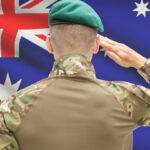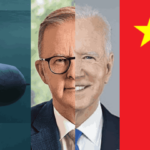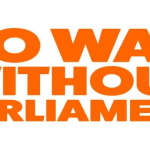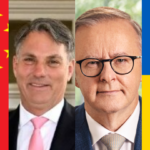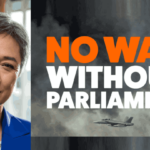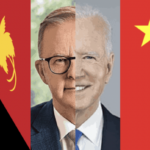“Our Actions Are Having a Political Impact”: Disrupt Wars’ Nathalie Farah on Rising Direct Action
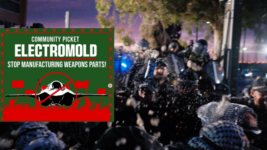
Direct actions out the front of weapons manufacturers in Australian suburbia, which are prompted due to the production of essential parts for weapons being utilised in the Gaza genocide that’s seen Israel annihilate around 40,000 Palestinians, have been taking place regularly since last October.
Identifying which manufacturers are involved in facilitating the mass killings of Palestinians is no easy task and, as has been repeatedly revealed of late, this is because the Australian government has deliberately buried this information and uses doublespeak to address the matter in public.
In federal parliament, foreign minister Penny Wong has repeatedly denied that the nation has exported any weapons to Israel for the last five years, which has incrementally been proven to be a lie, especially with the latest information regarding exports of the Drone Gun Mark 4 last year.
And during the course of this uncovering of how Australian manufacturing is contributing to the mass settler colonial extermination of the innocent people of Gaza, the Electromold facility based on the outskirts of Melbourne in Thomastown has been found to be an essential player in this war machine.
Cracking down on opposing genocide
The Gaza genocide has gone on for 10 months now. It’s the worst atrocity since the Holocaust. And a huge grassroots movement sprung up instantaneously to call on our government to stop its support of the mass killings, which it refuses to recognise as a genocide.
And for their troubles, in demanding that our country cut ties with Israel, an apartheid state, and to stop slyly contributing to the war machine that’s leading to the footage of kids shot to pieces or withering away due to starvation, the government has increasingly criminalised the demonstrators.
Nowhere has this been more apparent than in Naarm-Melbourne, as Victoria police has not only been going hard at pickets blocking access to manufacturing companies’ sites, but they’ve further turned on the mass family-orientated public demonstrations taking place on Sunday afternoons.
And last week, the Victorian authorities took an excessively forceful approach to an early morning community picket at the Electromold facility, and while Channel 7 portrayed the Victoria police officers as victims of a rabble, the truth is the cops just pepper sprayed the crowd as per usual.
Sydney Criminal Lawyers spoke to Disrupt Wars community organiser Nathalie Farah about why Electromold is being targeted, the aggressive manner which police took and whether she’s been surprised by the reaction of authorities from her perspective as a Syrian Palestinian woman.
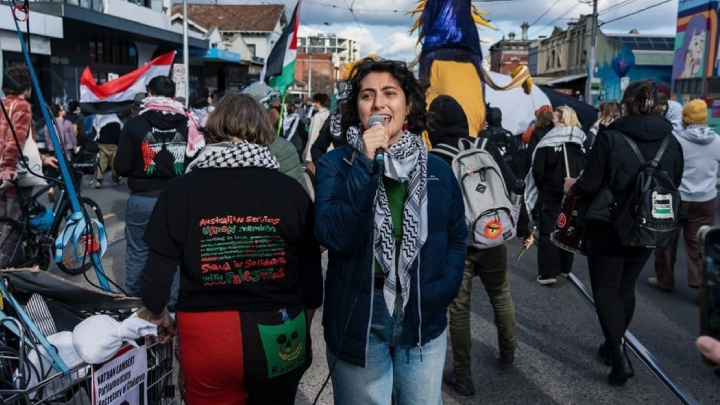
Nathalie, on 24 July, about 60 protesters staged a picket outside of an Electromold facility on the outskirts of Melbourne in Thomastown. And news reports featured scenes of Victoria police applying excessive force to antigenocide pro-Palestinian protesters.
But this has been a sustained action over many weeks. There are reports that the Friday before, 19 July, saw 250 demonstrators turn up. And you’re all showing up early morning, like at 5 am.
Over the last nine months, pro-Palestinian supporters in Naarm have been staging these ongoing protests outside of the premises of a number of different companies involved in the supply of weapons parts.
So, why the sustained actions at Electromold? And what would you say these actions have been achieving?
Over the past few months, we’ve been witnessing the most atrocious crime against humanity right on our screens, and as the latest iteration of the genocide is unfolding in Gaza, we’ve seen that our so-called leaders have been continuing to ignore the crimes of their communities.
They’ve ignored the hundreds of thousands marching each week on the streets in every city demanding justice.
So, we’ve rallied. We’ve petitioned, and we’ve lobbied politicians. And it seems like nothing has come of it.
We know that Australia is complicit in genocide, and we, on this continent, manufacture parts to weapons that provide the very same machinery that so-called Israel uses to murder innocent Palestinians.
So, we’ve done some extensive research, over a long period of time, much longer than since October 7, to identify the significant parts of the supply chain of these weapons, especially, more recently, for the F-35 fighter jet. And this is what brought us to Electromold.
Electromold plays a very significant part in that supply chain, and it was actually chosen because there is only one location of this company on the continent.
And as you said, this is not a unique instance of a campaign, as there’s been a lot staged recently against different weapons manufacturers in every state.
But this one seems to be getting a lot of media attention and a lot of involvement simply because of its location, which is on the north side of Melbourne, which is the progressive heart of this continent, but also because of the way police have been interacting with this action.
In terms of Electromold, itself, what they do is not only provide essential parts for the F-35 but they also manufacture JDAMs (Joint Direct Attack Munitions), which get assembled at Boeing, and these have been used in Israel recently.
They’re basically guidance tail kits that are attached to unguided bombs. So, they use GPS, guided capabilities and also incorporated artificial intelligence sensors, which convert an unguided free fall bomb into an accurate adverse weather smart munition.
As I mention, Boeing has been manufacturing these for decades, but on 18 October, Boeing was fast-tracking the delivery of about 1,200 of these kits to Israel.
And we know that Electromold actually plays a role in the manufacturing of these specific bombs. So, there’s the F-35 and some other bombs by Boeing, like the GBU-39.
So, Electromold plays a very strategic role in this supply chain. They’ve never actually been held to account before for the work that they do.
It is a pretty small company. There are only about eight employees per shift, and it’s very specific work that’s done.
So, they’ve been able to get away with what they’re doing for a long time, which was until the research revealed this. So, we’re holding them to account for supplying weapons.
Early on, during this crisis in Gaza, we found out that Rosebank Engineering, also in Melbourne, is the world’s only producer of a component of the F-35 fighter jets, which enables the bay doors of the aircraft to open, so bombs can be dropped from the planes.
So, what is it that Electromold does by way of assisting in parts and manufacturing?
Electromold is a subsidiary of Lovitt Technologies. They provide specialised surface coatings, plating and finishings to Lockheed Martin’s F-35 fighter jets, which can also be referred to as the Joint Strike Fighter.
So, without Electromold’s coating services, the F-35 would be servery disadvantaged in combat.
The demonstration on 24 July made headlines, due to the heavy-handed approach of police on the day.
And while VicPol has never taken the friendliest approach to actions staged outside of weapons manufacturers or companies who partake in, as Penny Wong likes to say, the manufacture of “non-lethal parts” of weapons, there does seem to have been an intensification in the way law enforcement is now handling these protests.
What happened last week at Electromold? And do you agree that the reaction of law enforcement is intensifying, and if so, why?
On that Wednesday, at Electromold, about 60 of us arrived at 3 am. And that was because the week prior to that, the workers were snuck in at 4 am, which was 2 hours ahead of our planned picket at 6 am. So, last week, we went there earlier.
And at about 4.30 am, some Victoria police arrived. And at first, we engaged with them in good conscience.
We had conversations and we had police liaisons, who were clearly identifiable in high-vis. And the liaisons were communicating between the protesters and the police over the course of about an hour and a half to two hours.
These people were known. They knew their full names and phone numbers. So, the communications were open.
From the beginning the liaisons indicated that the purpose of the protest action was to stop workers from going in, and the goal of that community picket was to stop that particular shift.
We indicated that to police. And we were clear it was only about this one shift in this one location – that was the aim.
We wanted to communicate with the manager to ask them to cancel the shift and that would be the end of that action. And we said, once we had confirmation that the shift was cancelled then, we’d go home.
We also discussed with the police and with the workers, whenever we get the chance to communicate with the workers, that we would be more than happy to fundraise to cover the cost of the shift that they’d lose.
That workplace, specifically, is not unionised, which means that they don’t get compensated for that cancelled shift.
That also goes into another area of the campaign that we’re interested in, which is asking a lot of the workers questions at a lot of these sites that we go to around Victoria.
Most of the workers who manufacture these parts are not unionised and they work on a casual basis, even though it’s highly specialised industries.
So, that’s also another question that we have.
If this place was unionised, a union official would have come down, seen that there was a protest action and would have said that due to worker health and safety they would demand that the manager cancel the shift. But that’s not happening because they’re not unionised.
The police at around 5.30 am started to threaten to move us by force under section 52 of the Summary Offences Act, which holds that you can be moved on if you are hindering or obstructing someone going into a place.
But we said that the workers weren’t there. We couldn’t see them. And so, it would be illegitimate and illegal to move us on for that reason.
They tried to argue that they wanted to go into the premises themselves, and we said that we’d let them in, but we just wanted to talk to the workers and tell them that we were not there for them or against them.
That went on for about an hour. We were really clear. We had some lawyers on the line, who also told us to argue in that way because that offence does not hold in that situation.
So, once the state realised that we weren’t going to back down, and we weren’t going to move-on, they then attempted to give a move-on order to the crowd. But the crowd was chanting and making a lot of noise, so they didn’t hear the order.
And that’s when PORT (the Public Order Response Team) was called in. And they’re very well known for being intense. Then there were six police horses. It was a massive police presence overall. There was also a drone flying above and later on a helicopter.
It was quite an escalation for something that was pretty simple. There wasn’t even a lot of people there, at its height we probably had 110.
So, PORT arrived and then without any kind of communication, they started to push and shove people.
There’s footage of people being choked and kicked and punched in the face. And then when they couldn’t push people by force, they then started to use pepper spray and we had over 40 people injured.
The footage clearly shows PORT forming a line and the other officers behind them would be spraying.
So, they had no idea where the spray was going. There was no discrimination. It was going everywhere. Some of the police got sprayed as well.
It was quite a chaotic way to deal with it, and according to their own regulations, this is an illegal way of using pepper spray.
So, they pushed people back and then pushed them into the horses, and the horses were getting scared and that’s when we retreated to our safe zones and the police then formed a line around the safe zone.
They also arrested six people on the spot. The people who were arrested were injured and they didn’t allow our medics to treat them for an hour.
So, in summary, I agree that law enforcement is intensifying. And that’s not just at Electromold. We’re seeing it at the Sunday rallies. We’re seeing it basically everywhere.
I told the media that the base interaction we now have with police, is to call in PORT, be pepper sprayed and then there’s a few arrests.
In terms of why the policing is intensifying now, at the beginning of this iteration of the genocide, so just around October, I don’t believe that the government or the police expected this to go on for this long.
By this I mean the genocide and the community mobilisation against Israel.
So, at the beginning, they were probably hoping it would be something that just wrapped up and went away or the people would run out of steam.
But it is not slowing down in any way, shape or form, and it’s becoming really clear that our actions are actually having a pretty big political impact, and it’s also affecting the way the world views Australia.
There is a certain way this country likes to present itself on the international stage: a progressive democratic nation that’s multicultural.
But our actions are exposing another face of this continent, which is riddled with complicity and then it goes on to drawing the connections with the genocide of First Nations people. So, these effects are really widening the scope of everything that we’re doing.
And that’s really terrifying for the state and the police, especially as we’re growing in numbers.
We are not lacking numbers but we’re lacking organisation. And so, it makes sense that the reaction would be this strong.
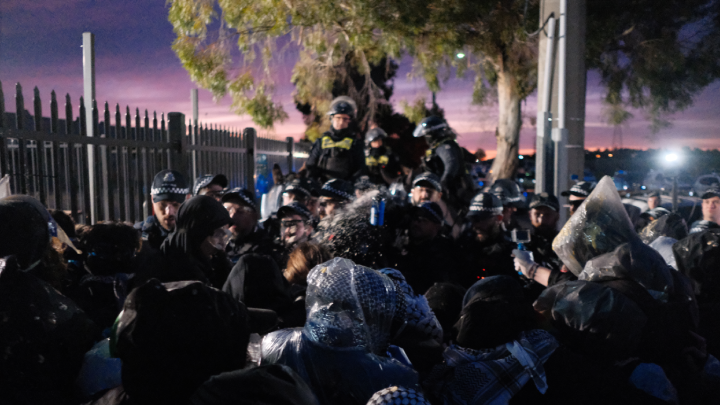
Victoria police have also started to take a heavier approach to the weekly Sunday protests in Naarm, which are held in the city, and have been taking place for ten months now.
But you’ve been running these on-manufacturing-site actions over that entire time as well, but now it seems that there’s an increase of people willing to get up at 3 am and head down to a factory in the middle of the night to disrupt production.
Why have you been taking these more drastic actions, when the pro-Palestinian street rallies have been so huge? And why do you consider more people are joining you now?
Community members are losing hope and faith in the traditional ways of campaigning and making their voices heard, like marching, rallying, petitioning or lobbying.
And this didn’t start in October. Palestinian Australians have been campaigning on this for decades and they’ve gotten absolutely nowhere.
The reason why more and more people are willing to take direct action is because they’ve been exposed to, or they’ve been shown, what we’ve known for a very long time.
There’s a saying in Arabic: Palestine will free us all.
The way that the government is reacting to this has shown people how the government has actually been dealing with all of the minorities that live here.
It’s not new. It’s not anything new. It’s just that most people were not exposed to it, as it’s been hidden in a really nice way under some beautiful green layers of multiculturalism and harmony days.
But in fact, there’s so much entrenched racism and discrimination at every level of the structures on this continent and most people haven’t seen that, and now they’re seeing it.
So, they’re asking themselves, “If our government does not take action when the most horrendous atrocities are taking place, then are they actually going to stand up for us, when something actually happens to us?”
And the answer is no. The government is not going to care a whole lot and that’s why they’re feeling inspired and motivated and maybe even pressured and forced to take action because rallying has not worked.
Also, as beautiful as huge rallies are, when they’re being held on a Sunday in the city every week, they stop being disruptive and the government can very easily ignore thousands of people on the streets
At some point, it just stops being enough to just march on the streets on a Sunday afternoon.
You’ve touched on my next question already, but as a Syrian Palestinian woman you’ve been part of the Free Palestine movement your whole life, and, as you’ve just noted, a lot of people have been shocked by the government’s reaction.
But as someone who has been part of the Free Palestine movement for a long time in Australia, has the reaction against it since last October been of any surprise to you?
No. It’s not a surprise. This is what I expected from the beginning. And the fact that it took this long to reach this level was actually a pleasant surprise.
I’ve been an activist, campaigning on refugee rights for a very long time, as well as Palestine, of course. And I’ve seen the way that the state interacts with antigenocide and antiwar activists.
I’ve also seen the way that the state interacts with asylum seekers and refugees and First Nations people, so none of this was a surprise to me.
But, in fact, to be honest, I did not expect this to be this big, and I did not expect it to go on for so long.
So, I am surprised by the fact that it is still ongoing, and it is still expanding in numbers. But in terms of the state reaction, unfortunately, this is exactly what I thought it would be.
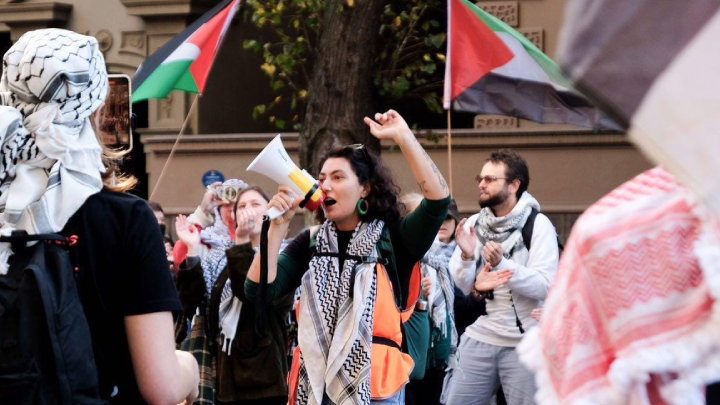
And lastly, Nathalie, over the past ten months, the reaction to the Gaza genocide seems to have brought together a huge diverse group of people uniting under the Free Palestine campaign. This is a mix that has not been seen so distinctly together on the streets before.
So, from your perspective and that of your fellow agitators, where is it all heading from here? The cops are getting more heavy-handed, and more protesters are turning up to the direct actions.
So, where do you envisage this is all going?
Until the government starts to effectively listen to the demands that different communities are making, then this is going to become harder and harder to ignore.
I don’t know exactly where this could go, because this is community led, and every community group has its own goals, strategies and tactics.
We’ve got all kinds of people doing all kinds of direct action across the spectrum and people are taking things into their own hands. It is not being led by a specific person or group or organisation.
So, it’s hard to predict exactly what it is going to look like, but for those of us who are organising within community, what we’re really hoping to do is to continue to raise awareness but also to cause a dent in the system that’s enabling genocide.
We want to expand this further and bring awareness to questions like why are we actually manufacturing weapons? And what do we have to do with that?
What we are seeing is, Australia is taking the path with Israel because of our connection with the US and because we will follow them wherever they would like to take us.
This relationship that we have. It manifests in a lot of different forms, and we’ve seen that with AUKUS, being the most recent example.
But ultimately, for as long as the US is going to be supporting Israel, which is always, and we unconditionally provide anything that the US wants then people are going to be protesting against that.
So, Australia needs to take a hard look at itself. First at our own complicity in the genocide against the First Nations people here and recognising what happened here properly.
There is still no treaty for settlers on this continent with First Nations people and we are the only colony without a treaty.
Then we really need to look at these relationships that we have with imperialism and look at the geography as well, where we are in the world, and the fact that we should be building relationships with Asia.
In terms of what I envision happening right here now, there are going to be more coordinated actions across different communities.
Every second-third day I hear statements from someone from another state or from a town saying they’ve just discovered a weapons manufacturer in their suburb, and they want to do something about it.
So, people are really passionate about this, and unless the government can start thinking about transitioning away from weapons manufacturing into providing workers with jobs where they’re going to manufacture products for the community right here.
Because at the end of the day, it is also not the workers fault that they can’t find manufacturing jobs that don’t involve weapons. So, until that happens people are going to keep taking action.


